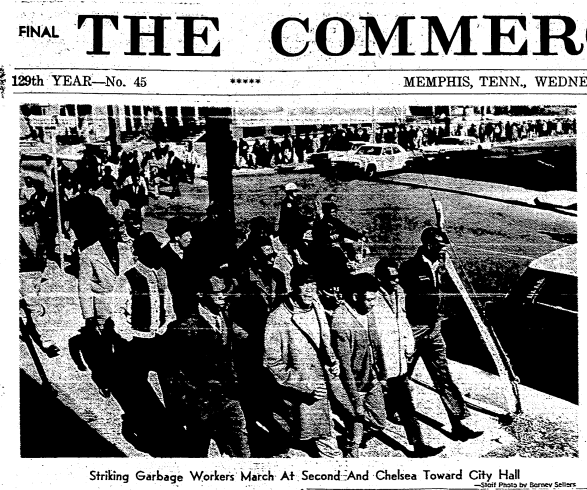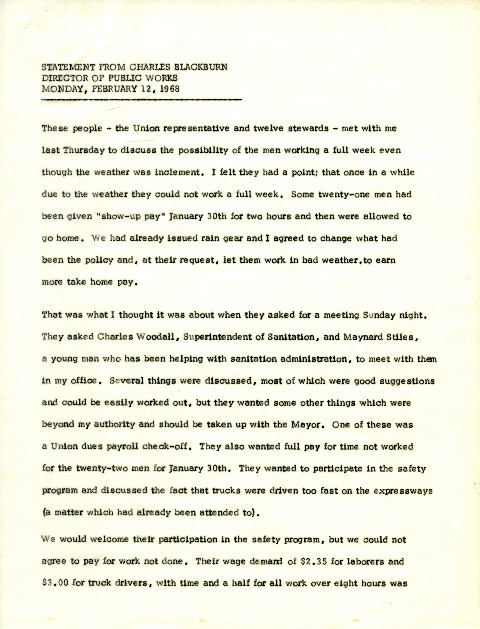
Commercial Appeal, 14 Feb. 1968, FINAL, p. 1.
Feb 12, 1968 – Late last night, roughly 400 to 700 members of the city’s public works division, mostly men from the sanitation department, voted to go on strike. Gathered at a union hall on 2nd street, the men attended the meeting to discuss a potential strike at the invitation of members of local 1733, a union that hopes to organize employees in the public works division.
The decision to strike followed a meeting between Charles Blackburn, director of public works, and union representatives of the men in public works. The union representatives consisted of Mr. T.O. Jones, president of local 1733, and twelve union stewards. The meeting took place in Mr. Blackburn’s office. With Mr. Blackburn were Mr. Charles Woodall, superintendent of sanitation, and Mr. Maynard Stiles, a district superintendent of sanitation.
The mass meeting of public works employees started around 6pm and lasted until at least 10:30 or 11pm. Two events in particular prompted last night’s gathering. The first was an incident where superintendents within sewer and drain maintenance sent 21 men home with only two hours pay because heavy rain prevented work. The second was the tragic deaths of Echol Cole and Robert Walker; both men were crushed to death by the compressor on a city garbage truck on the first of this month. The city has only agreed to pay their families $500.00 each for burial expenses, and the whole episode has rattled the men in public works. As for the other incident, Mr. Jones has repeatedly demanded that Mr. Blackburn pay the men in question for a full day. Mr. Blackburn has so far refused. However, he has adjusted the rainy day policy.

“Statement from Charles Blackburn, February 12, 1968”. Civil Rights Collection, DIG Memphis.
At the start of the mass meeting, there were a couple of calls for a walkout from the men. However, the majority opted for one more attempt at negotiations, and Mr. Jones took down a list of their demands to present to the public works director. They included a raise to $2.35 an hour for laborers (current pay is $1.65-$1.85) and a raise to $3.00 an hour for truck drivers (current pay is $2.10). Many of the men currently qualify for food stamps despite working full time. They also asked for time and a half pay for overtime beyond 8 hours, participation by the public works division in a safety program, a rule against garbage trucks driving too fast, pay for the men sent home due to rain, and formal recognition of the union by the city.
The last demand has been the subject of previous meetings between union representatives and Mr. Blackburn. On February 1, the public works director met with both Mr. Jones and Mr. P.J. Ciampa, field services director for the American Federation of State, County, and Municipal Employees (AFSCME). AFSCME is the national union which local 1733 belongs to. At that meeting, both Mr. Jones and Mr. Ciampa pushed for the city to grant the union a dues checkoff.
A dues checkoff or payroll checkoff involves the automatic deduction from an employee’s paycheck of the dues that an employee pays to the union. Local 1733 currently relies on members to consciously support the union, and this practice has led to difficulties organizing workers. Only about 30 to 50 men regularly pay dues out of a total membership of roughly 300.
As with any union, the strength of local 1733 comes from the number of people within a workforce that it is able to organize. The more people organized the better its bargaining position will be in negotiations with the city. Mr. Ciampa has previously noted that he has received nearly 700 requests for an automatic deduction of union dues. Many of these 700 requests, out of a total workforce within the sanitation department of about 1100, may come from workers afraid to publicly join the union out of fear of losing their jobs. Granting the union an automatic deduction of dues would be equivalent to formally recognition of the union by the city.
Right now, the city does not formally recognize the union and could potentially fire employees for belonging to it. In fact, Mr. Jones and 33 other men lost their jobs in 1963 for attempting to organize the current union.
To Mr. Ciampa and Mr. Jones, the money from union dues is essential to paying for any union infrastructure to help organize employees and to push back in a potential dispute with the city. For example, the money might go toward retaining a lawyer if there is a legal dispute with the city or used to establish a strike fund. All of this improves the union’s bargaining power in any potential negotiations over pay or working conditions.

“Sanitation Workers”. Memphis Sanitation Workers’ Strike, 1968. Special Collections Dept., University Libraries, University of Memphis.
With that in mind and the list of demands in hand, Mr. Jones left the mass meeting and led the union delegation to the meeting in Mr. Blackburn’s office. Meanwhile, the majority of the men remained in the union hall to await an answer. On participation in a safety program and a rule against garbage trucks driving too fast the two sides could agree. However, Mr. Blackburn would not acquiesce to raises, overtime pay, or an automatic deduction of union dues. He stated that he felt those items would be the mayor’s and possibly even the new city council’s prerogative. He also mentioned that the public works division has inherited a $350,000.00 deficit from the previous administration.
Mr. Blackburn invited the members of the union delegation to talk things over with the mayor. However, the response was cool. One of the union stewards replied that they “didn’t want to see any mayor in any plush office.” Mr. Jones tried to convince the public works director to come down to the union hall to explain things, but Mr. Blackburn refused to go before the men. It was at this point that the union president seems to have realized that a walkout was likely. Because he dramatically proclaimed, “Call the chancellor. I’m ready to go to jail.” This is a reference to a 1966 chancery court injunction prohibiting sanitation workers from striking against the public health.
The mood at the end of the meeting in Mr. Blackburn’s office was angry. According to the public works director, someone in the room mentioned something about “that they should see the mayor tomorrow.” One of the union stewards shot back, “we’re not gonna be there tomorrow.” Back at the union hall, there were boos and catcalls when a steward reported Blackburn’s response to the men’s demands. One man yelled, “He gives us nothing, we’ll give him nothing.”
It appears word of the strike spread via word of mouth from the men who had attended the meeting to many of those who hadn’t. So by this morning, a large portion of the workforce within the public works division did not show up for work.
Union stewards met others outside the gates of sanitation installations, urging them to not go to work. So far, the strike seems to have had a significant impact on the city’s ability to collect garbage. Normally, the city operates 185 trucks a day. However, Mr. Blackburn seems to have managed to only get 34 trucks operating.
As of this evening, 930 workers in the sanitation department are out on strike in addition to 214 laborers in sewer and drain maintenance and the asphalt plant. The scene is reminiscent of the recent strike by ten thousand New York City sanitation men that ended just two days ago. That dispute saw lasted over a week and saw nearly 100,000 tons of refuse pile up. With any hope, the strike here will be resolved with less trouble.
“Interview with Charles Blackburn,” (Parts 3, 6, 7, 9, 10, 11). YouTube, Uploaded by Crossroads Archive. Original tapes found in Memphis Search for Meaning Committee Records, University of Memphis Libraries Preservation and Special Collections Department.
“Interview with Ed Gillis,” (Part 18). YouTube, Uploaded by Crossroads Archive. Original tapes found in Memphis Search for Meaning Committee Records, University of Memphis Libraries Preservation and Special Collections Department.
“Interview with Mr.and Mrs. L. C. Reed,” (Part 3). YouTube, Uploaded by Crossroads Archive. Original tapes found in Memphis Search for Meaning Committee Records, University of Memphis Libraries Preservation and Special Collections Department.
Statement From Charles Blackburn, February 12 1968. Civil Rights Collection, DIG Memphis.
Sweat, Joseph. “Loeb Issues Order To Stop Garbage Strike.” Commercial Appeal (Memphis, TN), Feb. 13, 1968.
Unknown. “Hard, Dramatic Bargainer Acts Tough Role For The City.” Commercial Appeal (Memphis, TN), Feb. 13, 1968.
Beifuss, Joan Turner. At The River I Stand. 2nd ed. Memphis: St. Luke’s Press, 1990.






